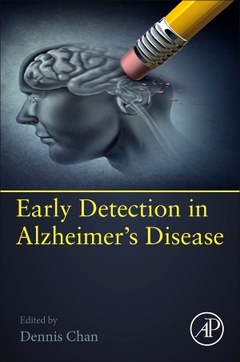L’édition demandée n’est plus disponible, nous vous proposons la dernière édition.
Early Detection in Alzheimer's Disease Biological and Technological Advances
Langue : Anglais
Coordonnateur : Chan Dennis

Early Detection of Alzheimer?s Disease: Biological and Technological Advances aims to introduce to a wide audience the high global priority problem of detecting AD prior to dementia onset. According to the Alzheimer?s Association, 5.8 million Americans are living with Alzheimer?s and care costs will cost the nation approximately $290 billion (2019 Alzheimer?s Disease Facts and Figures). With the failure of recent AD drug trials, many hypothesize that by the time symptoms appear, it is too late to be treated. Early detection can offer benefits such as more choice of medications, ability to participate in clinical trials, more time for family and for care planning. This book outlines potential solutions to the above problem using opportunities arising from the technology revolution, advances in neuroscience, and molecular biology. Most importantly, it discusses a paradigm shift from a reactive to a proactive diagnostic approach, aiming to detect disease before occurrence of symptoms. Topics covered include the use of sensing technologies (e.g. smartphones, smartwatches, Internet of Things) to detect early disease-related changes, the application of data science (machine learning/AI) to extract otherwise invisible disease features from these datasets and the potential to personalize diagnosis based on tracking changes in individual behaviours. Advances in blood-based biomarkers, brain imaging, and the potential for early diagnosis to aid interventions (lifestyle, dietary, pharmacological) to delay future development of dementia are also discussed.
1. Foreword
2. Introduction
3. Early Alzheimer’s disease
4. The need for early diagnosis
5. An overview of current diagnostic strategies
6. Novel approaches to diagnosis
7. Challenges for the new approach
8. An eye to the future
2. Introduction
3. Early Alzheimer’s disease
4. The need for early diagnosis
5. An overview of current diagnostic strategies
6. Novel approaches to diagnosis
7. Challenges for the new approach
8. An eye to the future
Dr. Chan, PhD MD FRCP is an academic neurologist with a special interest in the diagnosis of Alzheimer’s disease prior to the onset of dementia. He holds dual research doctorates in basic and clinical neuroscience. His NHS practice is based at Addenbrooke’s Hospital, Cambridge, where he undertakes clinics in general neurology, dementia and mild cognitive impairment. His research focuses on identifying alterations in the function of the entorhinal cortex (EC) and hippocampus in early Alzheimer's disease (AD), with the ultimate aim of diagnosing AD prior to symptom onset.
- Outlines the importance of early diagnosis of Alzheimer’s Disease
- Helps readers understand the limitations of current clinical approaches and the need for a paradigmatic shift in diagnostic practice
- Discusses the potential role of technology in clinical practice using machine learning and artificial intelligence and the potential to personize diagnosis and treatment
Date de parution : 11-2024
Ouvrage de 300 p.
15x22.8 cm
Thème d’Early Detection in Alzheimer's Disease :
© 2024 LAVOISIER S.A.S.



